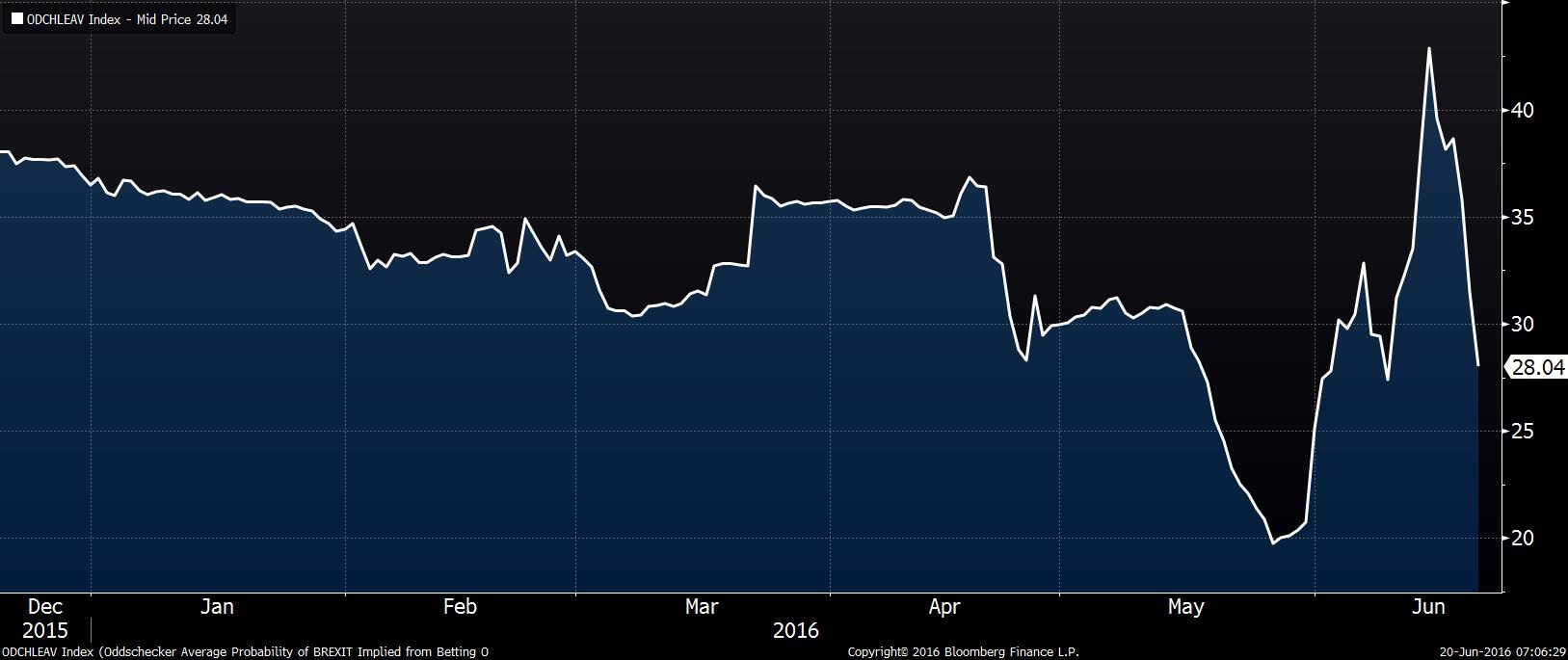Daily Comment (June 20, 2016)
by Bill O’Grady and Kaisa Stucke
[Posted: 9:30 AM EDT] There are three big stories today.
Leaning toward Bremain: In the wake of the assassination of MP Jo Cox, the first polls out suggest that the Bremain camp has halted the Brexit momentum. Still, polls suggest a tight race, with 45% wanting to remain in the EU and 42% wanting to leave. We prefer the betting pools and they are decidedly in the Bremain camp.
This chart shows the leave bets, which peaked around 45% but have fallen precipitously to the 28% level. We suspect that Britain will vote to stay in the EU. That outcome won’t completely eliminate the drama as a close vote could lead to a backbench revolt against PM Cameron. However, for the markets, the “inside baseball” of U.K. politics won’t be a big deal.
Market reaction today is clearly a sign of relief. The GBP is up strongly, equities around the world are higher and oil is up, while gold and sovereign debt prices are lower. In fact, we may be preparing for another bout of “risk on” in the markets. The two factors hanging over the markets have been Brexit and the Fed. We believe the former is tilting toward a market-calming outcome and the Fed may be friendly as well. Think of it this way. Since the summer of 2014, we have seen a steady tightening of monetary policy. Tapering ended the expansion of the balance sheet, the dollar rallied and the Fed moved rates higher. The combination had an adverse impact on financial markets and probably the economy. Although we don’t expect the Fed to ease or resume QE, a weaker dollar will act as a policy stimulus. The primary reason for dollar strength has been the divergence of monetary policy—the Fed was tightening while the rest of the world was easing. If the Fed merely goes “steady” and expectations for tightening pull back, the dollar could weaken and, in a few months, lead to an improving economy and likely better earnings. In other words, removing the likelihood of tightening policy and Brexit might give equity markets an upleg in the coming weeks.
At the last Fed meeting, we had a unanimous decision, with KC FRB President George voting with the group. St. Louis FRB President Bullard’s bombshell last Friday suggests an entirely new regime for implementing monetary policy that, in the short run, will lead to at least one moderate hawk becoming a full dove. We doubt Stanley Fisher will be swayed by Bullard’s new stance, but Bullard’s position is compelling for Chairwoman Yellen because it gives the FOMC an excuse to remain easy.
Of course, there will be other worries. The elections will raise concerns and there are other issues in the world that could dampen sentiment. Nevertheless, if the U.K. remains and the Fed isn’t going to raise rates more than one time, the dollar could weaken and boost the U.S. economy and equities.
Modi shoots an own goal: Raghuram Rajan, the current governor of the Reserve Bank of India, has indicated he will leave his post in September when his term ends. Rajan is a well-respected financial figure and a solid central banker. Under his watch, India’s inflation has eased and the economy appears to be on solid footing. However, Modi and his political cronies are unhappy with Rajan, likely for two reasons. First, he has kept policy tighter than they would like; there is no surprise here. Politicians are rarely fans of prudent monetary policy. Second, and perhaps more worrisome, the political class is reportedly uncomfortable with Rajan’s international status. This status makes him independent and less easy to control. According to reports, Modi wants a RBI governor that will be more sensitive to political pressure. This is a bad time for India to be flirting with monetary populism. Rajan has stabilized the Indian currency and fostered controlled inflation. The next governor will, almost by design, lack the credibility of Rajan and so, expect more monetary stimulus and inflation in India.
China and Venezuela: As we have reported recently, the Venezuelan economy is in shambles due to lower oil prices and mismanagement. China, the country’s largest creditor, is in talks with Venezuela over debt restructuring. What is interesting is that Chinese negotiators are also talking to the opposition, wanting Madero’s opponents to agree to any debt deal to avoid repudiation if there is a change in government. By forcing the opposition into the talks, China is also improving the status of the anti-Maduro factions which might undermine the current regime.



